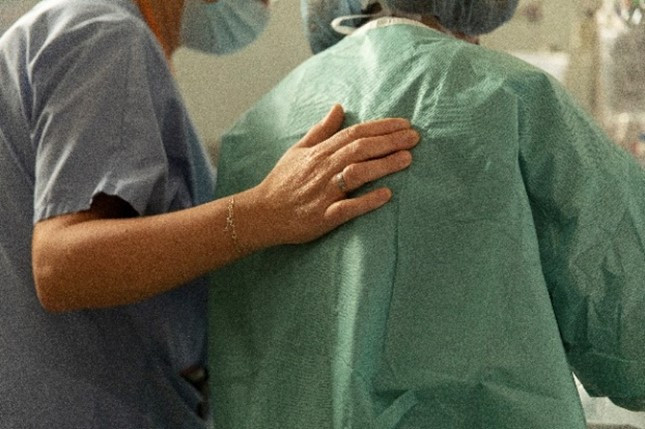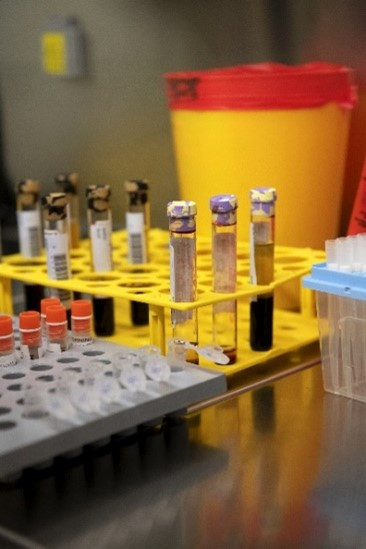
"Rare cancers are cancers with an incidence of less than 6 per 100,000. They are also pathologies that require highly specialized care - because of their particular location, their complexity or their occurrence in a specific context. Today, too many patients suffering from these rare cancers suffer from misdiagnosis, inappropriate or even harmful treatments, and are left to fend for themselves," explains Prof. Thierry Philip, Chairman of Institut Curie's Executive board.
These rare cancers are complex and can occur anywhere in the body. They encompass many different types of cancer. The list of rare cancers is long, and ultimately concerns a significant proportion of cases. Dealing with the problem of rare cancers is a major challenge for oncology, which explains why special attention is paid to finding solutions and providing the best possible support for patients and their families. "A better understanding of how these rare pathologies arise, from a genetic, molecular and biological point of view, enables Institut Curie researchers to grasp the phenomena involved and, above all, to develop new diagnostic and therapeutic approaches, thanks to cutting-edge technologies and, above all, to the work carried out jointly with medical teams. We need to invest, because academic and public research is even more important in the field of rare diseases," asserts Prof. Alain Puisieux, director of Institut Curie’ Research Center.
“Rare cancer" networks and structured care paths
In France, national reference networks (structured around reference centers) and expert centers have been set up to optimize care for patients with rare cancers. Réseau Mélachonat for uveal melanoma, LOC for oculocerebral lymphoma, NetSarc+ for sarcoma...Institut Curie leads and actively participates in a number of these networks.
Thanks to this organization, every patient has access to medical expertise by joining integrated, specialized care pathways from the outset of their care (verified diagnosis with re-reading of tumor samples, collegial discussions of each medical file). At Institut Curie, for example, CUSTOM (CUrie Sarcomes et Tumeurs complexes des Os et tissus Mous) provides a personalized diagnostic pathway that has been in place for over 5 years for patients presenting with a suspected sarcoma lesion (from imaging to anatomopathological and molecular biology analyses, right through to the therapeutic decision at the "sarcoma" multidisciplinary consultation meeting).
Other key elements of these networks include training for healthcare professionals, relations with national patient associations and communication with the general public.
"Several Institut Curie teams are involved in the national and European coordination of these rare cancer expertise networks. This ensures that patients have access to the latest therapeutic innovations. What's more, these networks offer shared access to patient databases, which is essential when you consider that one of the major challenges we face is conducting clinical trials, which is complicated by data scarcity", says Prof. Steven le Gouill, Director of Institut Curie Hospital Group.
Highly specialized care and clinical research
"The added value of expert centers such as Institut Curie is considerable. Studies have shown that, in sarcomas for example, when surgery is carried out in an expert center, patients have a better prognosis. On a day-to-day basis, we follow patients with very rare cancers. And we do our utmost to find therapeutic solutions," says Dr. Sarah Watson, oncologist and researcher at Institut Curie.
Interventional radiology, molecular characterization, anatomopathology, complex surgery, radiotherapy, clinical trials: Institut Curie teams are constantly exploring and perfecting every facet of the management of rare cancers. For example, concerning sarcomas, complex and heterogeneous tumors that can affect numerous tissues, a recent study showed that a simple percutaneous biopsy[1] of retroperitoneal sarcomas (in the abdomen) carried out prior to any treatment enabled the diagnosis to be clarified in 98% of cases, enabling the therapeutic strategy to be adapted.
Another example in pediatrics: strategies have progressed considerably in recent years, notably with the development of new targeted therapies. Larotrectinib (a TRK (Tropomyosin kinase) receptor inhibitor) is proving extremely effective in a very specific type of childhood sarcoma (linked to a TRK fusion protein anomaly), considerably changing the prognosis of young patients.

As for Institut Curie hematologists, their expertise has led to major developments, particularly in the treatment of lymphomas (cancers of the lymphatic system). Our work on oculocerebral lymphomas (lymphomas of the brain and/or primary intraocular lymphomas) has enabled us to standardize treatments and test new targeted therapies. In mantle cell lymphoma, results have just been published. "Six years ago, we proved the value of adding immunotherapy to these very rare lymphomas, and changed the standard of treatment. Now, we have shown that the benefits of this treatment persist in three quarters of patients, without relapse, even after the treatment has been stopped", says Prof. Steven Le Gouill, who led the study[2].
Uveal melanoma, the most common malignant tumor of the eye, is another case in point. While this rare cancer can generally be successfully treated when diagnosed at an early stage, more than a third of patients develop metastases, mainly in the liver, which considerably limits therapeutic options and prognosis. However, research coordinated by Institut Curie, a national expert center, has shown that a new immunotherapy molecule (a bispecific antibody), tebentafusp, considerably improves survival in a specific patient population.
Excellent research and a state-of-the-art environment
By the end of 2023, Institut Curie researchers and physicians will have embarked on an ambitious uveal melanoma project. It involves discovering new genetic risk factors to better understand the disease and develop a blood test; identifying new antigens specific to uveal melanoma to develop immunotherapies and therapeutic vaccines; and studying the mechanisms by which healthy melanocytes transform into melanomas.
"In uveal melanoma, we are working to identify biomarkers in order to assess the efficacy of immunotherapies, find new radiological criteria for treatment efficacy, and explore the treatment process in terms of supportive care (in particular through our Early Together study). Institut Curie's medical-scientific environment is highly conducive to the emergence of new ideas and strategies. Every year, these innovations are presented to patients during an annual day of exchange, which will take place this year on February 2, 2024, just before International Cancer Day," enthuses Dr. Manuel Rodrigues, oncologist and researcher at Institut Curie.
Another example of research in progress: researchers and doctors are studying the role of iron in the proliferation of sarcoma tumour cells. Indeed, certain molecules developed by the "Chemical Biology" team at Institut Curie appear to be particularly effective in destroying tumor cells of certain sarcoma subtypes. In this context, a multi-disciplinary project involving radiologists at Institut Curie is currently being set up to quantify iron from MRI images and predict disease progression - before launching a clinical trial.
Numerous research projects also rely on artificial intelligence analyses. For example, a current project on follicular lymphoma aims to establish specific disease profiles with response markers to treatment, thanks to the integration of large clinical, imaging and sequencing datasets collected over the last 20 years (in compliance with current regulations).
Another study supported by Institut Curie focuses on leukemias, other blood cancers linked to the uncontrolled multiplication of immature blood cells in the bone marrow. More specifically, the teams are working to understand and explain the appearance of a particular type of leukemia (secondary acute myeloid leukemia) that occurs years after another cancer has been treated with chemotherapy. To achieve this, researchers are using single cell analysis and machine learning algorithms to decipher aspects of cell biology, aiming to develop ways of preventing leukemia.
|
ZOOM on... cancers of unknown origin. These rare cancers are detected by the presence of metastases, without identifying the first organ affected. This type of cancer accounts for 2 to 3% of all cancer cases (approximately 7,000 patients per year in France) and is particularly challenging to treat. In 2019, Dr. Sarah Watson's team developed the first effective, reproducible and clinically routine method to help identify the origin of these cancers. Using next-generation RNAseq sequencing (to sequence all the genes expressed in a tumor), the researchers established a "diagnostic classifier" (TransCUPtomics) based on the expression profiles of over 20,000 tumors and normal tissues. They then succeeded in developing a deep-learning algorithm that learnt to successfully match a given RNA profile to a specific organ or tissue, whether cancerous or not. |
Find out more: 3 appendices:
- Sarcomas in adults and children: Institut Curie, a national expert center for multidisciplinary care. Sarcomas affect between 4,000 and 5,000 people every year in France. They are rare, extremely complex, heterogeneous tumors that can occur anywhere in the body, in bone tissue (osteosarcoma) or soft tissue (liposarcoma, fibrosarcoma, rhabdomyosarcoma...). Institut Curie is an expert center for the treatment of adult and pediatric sarcomas.
- Uveal melanoma: treatment and research to improve patients' quality of life. With 500 new cases every year in France[3], uveal melanoma is the most common malignant tumor of the eye, particularly in people in their sixties with fair skin and eyes. Institut Curie welcomes the majority of French patients, as the national referral center for this still poorly understood cancer
- Expertise and promising research in rare hematological cancers. Hematological cancers are numerous, and their great diversity is one of the reasons behind the complexity of therapeutic strategies for these blood disorders. With 16,000 new cases every year, lymphomas, cancers of the lymphatic system, account for almost half of all hematological cancers, with around sixty sub-types. Institut Curie is an expert in these pathologies, recognized for its clinical, translational and more fundamental research.
[1] Percutaneous biopsy: removal of tissue fragments using a needle, through the skin
[2]Long-Term Follow-Up of Rituximab Maintenance in Young Patients With Mantle-Cell Lymphoma Included in the LYMA Trial: Une étude LYSA
[3]https://www.medecinesciences.org/en/articles/medsci/full_html/2018/02/medsci20183402p155/medsci20183402p155.html